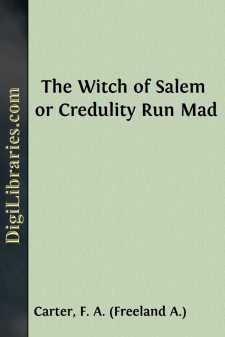Categories
- Antiques & Collectibles 13
- Architecture 36
- Art 48
- Bibles 22
- Biography & Autobiography 813
- Body, Mind & Spirit 142
- Business & Economics 28
- Children's Books 15
- Children's Fiction 12
- Computers 4
- Cooking 94
- Crafts & Hobbies 4
- Drama 346
- Education 46
- Family & Relationships 57
- Fiction 11828
- Games 19
- Gardening 17
- Health & Fitness 34
- History 1377
- House & Home 1
- Humor 147
- Juvenile Fiction 1873
- Juvenile Nonfiction 202
- Language Arts & Disciplines 88
- Law 16
- Literary Collections 686
- Literary Criticism 179
- Mathematics 13
- Medical 41
- Music 40
- Nature 179
- Non-Classifiable 1768
- Performing Arts 7
- Periodicals 1453
- Philosophy 64
- Photography 2
- Poetry 896
- Political Science 203
- Psychology 42
- Reference 154
- Religion 513
- Science 126
- Self-Help 84
- Social Science 81
- Sports & Recreation 34
- Study Aids 3
- Technology & Engineering 59
- Transportation 23
- Travel 463
- True Crime 29
The Witch of Salem or Credulity Run Mad
Categories:
Description:
Excerpt
CHAPTER I.
THE MAN WITH THE BOOK.
Through shades and solitudes profound,The fainting traveler wends his way;
Bewildering meteors glare around,
And tempt his wandering feet astray.
—Montgomery.
"Take it away!"
The autumnal evening was cool, dark and gusty. Storm-clouds were gathering thickly overhead, and the ground beneath was covered with rustling leaves, which, blighted by the early frosts, lay helpless and dead at the roadside, or were made the sport of the wind. A solitary horseman was slowly plodding along the road but a few miles from the village of Salem. In truth he was so near to the famous Puritan village, that, through the hills and intervening tree-tops, he could have seen the spires of the churches had he raised his melancholy eyes from the ground. The rider was not a youth, nor had he reached middle age. His face was handsome, though distorted with agony. Occasionally he pressed his hand to his side as if in pain; but maugre pain, weariness, or anguish, he pressed on, admonished by the lengthening shadows of the approach of night. Turning his great, sad, brown eyes at last to where the road wound about the valley across which the distant spires of Salem could be seen, he sighed:
"Can I reach it to-night? I must!"
Salem, that strange village to which the horseman was wending his way, in October, 1684, was a different village from the Salem of to-day. It is a town familiar to every American student, and, having derived its fame more from its historic recollections than from its commerce or industries, its name carries us back two centuries, suggesting the faint and transient image of the life of the Pilgrim Fathers, who gave that sacred name to the place of their chosen habitation. Whatever changes civilization or time may bring about, the features of natural scenery are, for the most part, unalterable. Massachusetts Bay is as it was when the Pilgrim Fathers first beheld it. On land, there are still the craggy hills, with jutting promontories of granite, where the barberries grow, and room is found in the narrow valleys for small farms, and for apple trees, and little slopes of grass, and patches of tillage where all else looks barren.
The scenery is not more picturesque to-day, than on that chill autumnal eve, when the strange horseman was urging his jaded steed along the path which led to the village. His garments were travel-stained and his features haggard.
Three hunters with guns on their shoulders were not half a mile in advance of the horseman. They, too, evidently had passed a day of arduous toil; for climbing New England hills in search of the wild deer was no easy task.
They were men who had hardly reached middle age; but their grave Puritanic demeanor made them look older than they were. Their conversation was grave, gloomy and mysterious. There was little light or frivolous about them, for to them life was sombre. The hunt was not sport, but arduous toil, and their legs were so weary they could scarcely drag themselves along.
"Now we may rejoice, John Bly, that home is within sight, for truly I am tired, and I think I could not go much farther," one of the pedestrians remarked to the man at his side.
"Right glad will I be when we are near!" answered the fatigued John Bly. "This has been a hard day with fruitless result."
"We have had some fair shots to-day," put in a third man, who walked a little behind the others.
"Verily, we have; yet what profits it to us, Samuel Gray, when our guns fail to carry the ball to the place? I had as many fair shots to-day as would bring down a dozen bucks, and yet I missed every time....




